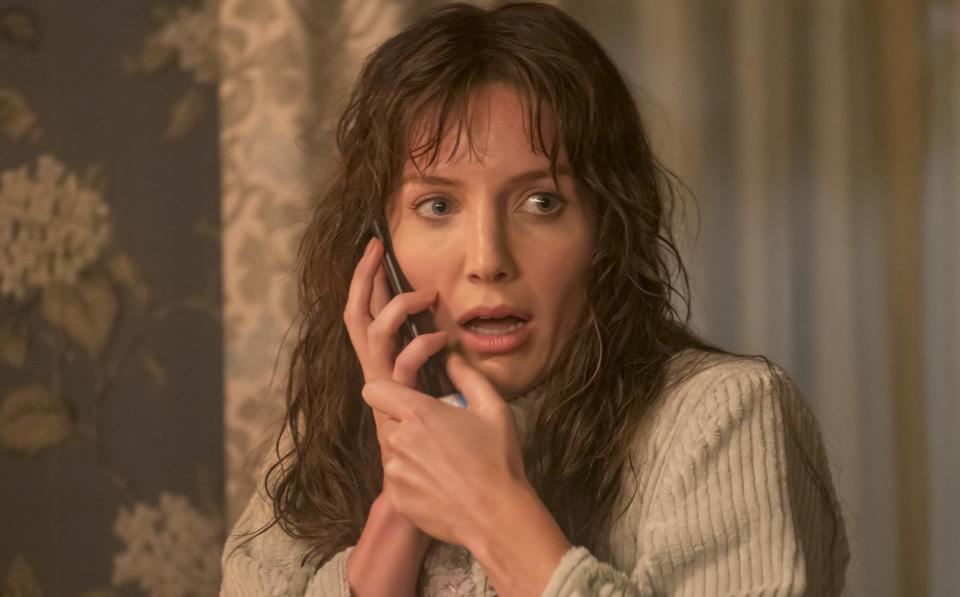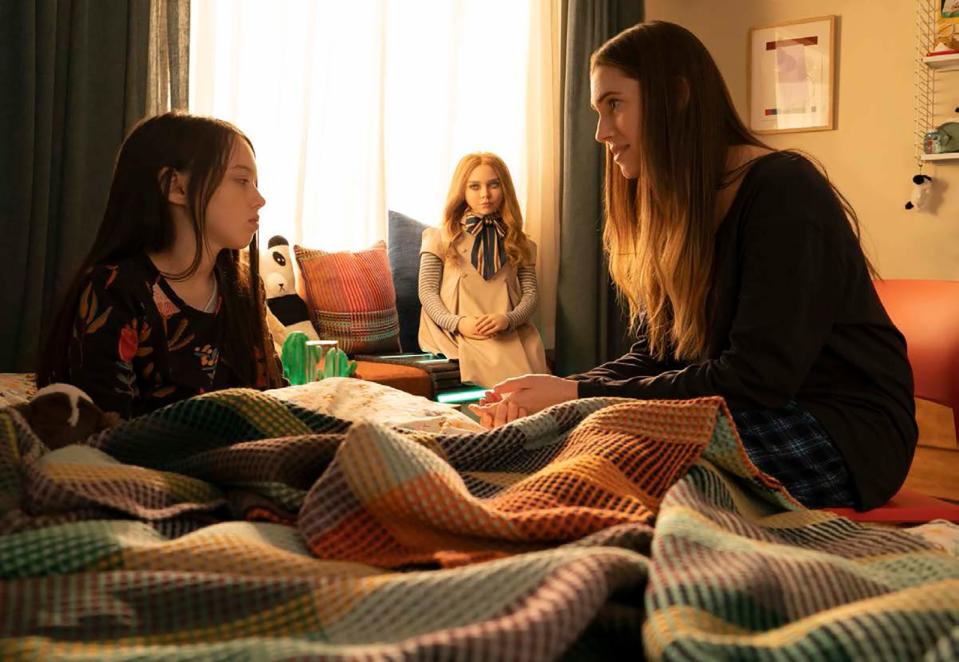Genre-Busting Writer Akela Cooper Is Twisting The Rules On Horror: “I Am Trailblazing For Those Who Want To Do This As A Career”
- Oops!Something went wrong.Please try again later.
- Oops!Something went wrong.Please try again later.

While most families spend their nights huddled around the TV watching the latest PG-rated family-friendly fodder, horror writer Akela Cooper’s family was up to something a little more sinister. “I watched a lot of R-rated horror movies with my brother, sister and my parents,” Cooper recalls with a laugh. Often anxiously enthralled by the latest creature feature or delightfully spooked by a certain sweater-clad dream demon hell-bent on terrorizing small-town teenagers while they slept, Cooper felt she didn’t have a fighting chance to rebel against the innate pull of eventually becoming a professional Hollywood horror writer.
“Horror speaks to me in ways other genres don’t,” Cooper says. “And I think it’s because horror and sci-fi allow you to address real-world issues with a kind of shiny veneer that allows you to have a message without people feeling like it’s preachy.” Specifically, Cooper cites an influential episode, “A Town has Turned to Dust,” written by Rod Serling from the 1950s CBS anthology series Playhouse 90, as a stepping stone for her tonality in balancing between sci-fi, horror and social commentary. “Originally, he wanted to do a TV movie about the killing of Emmett Till, and at the time, CBS was like, ‘Fuck no, you’re not going to do that.’ So, he took that story and set it as a Western with a Mexican kid at the center. But it was still the same story, but because it was removed with that genre veil, he still got the message that he wanted to get out anyway,” Cooper explains. “You get to do crazy shit in sci-fi and horror, as long as you have the rules that you follow—and those are fun.”
More from Deadline
With two viral cult hit features under her belt, Malignant and M3GAN, made in collaboration with heralded minimalist horror writer-director James Wan, Cooper is not only having fun but is also twisting the rules on a well-worn horror genre, the B-movie. It’s not typical for B-movies to elicit emotion. The low-budget films were initially conceptualized for quick, consumable entertainment and scares, not longevity. However, Cooper managed to infuse and maintain the essence while also pushing the boundaries of the genre.

2021’s Malignant is a gonzo Giallo-inspired slasher that is equal parts campy and violent. The film centers itself around the fury of a murderous twin tumor that emerges from the back of a woman’s skull. Hampered by the pandemic model simultaneous release on HBO Max, Malignant was an underserved box office flop that found bigger success and a cult following online. However, the following year marked a huge success for Cooper with the release of M3GAN. The AI-centric story acts as a glossy cautionary tale about the dangers of technology wrapped up in the cute but murderous hijinks of a high-end perfect companion doll for children. At the behest of Wan, who craved a modern-day version of Child’s Play for a new generation of horror fans who didn’t grow up with the franchise, Cooper took a risk at treading familiar ground while making it delightfully bonkers in the process. M3GAN surprised and dominated at the box office pulling in $180 million against its $12 million budget. In addition to that, the viral swoopy murderous dance seen in the film picked up $1.3 billion views on TikTok, cementing her place in pop culture as a cult horror movie icon. From there, it was clear that the pair had tapped into something audiences were responding to. Perhaps a desire to consume wacky horror that straddled the line between B-movie quality, emotionality, and supernatural dread, as opposed to the most recent onslaught of elevated horror by the likes of contemporaries such as Jordan Peele or Ari Aster.
“Elevated horror is still the acceptable horror right now. We’ve punched some holes in that with Malignant and M3GAN to make way for B-movies, which I was happy with,” Cooper explains. “You got stuff like Barbarian and Smile, which was half elevated, half B-movie, monster movie, which was cool. Right now, the market seems like a 60/40 split for elevated versus traditional B-horror movie tendencies.”
Though B-movies aren’t a new phenomenon, Cooper does acknowledge the unique element in her projects that not only translates to box office success but also leaves a lasting cultural imprint. “I think people are responding to the fun because, for a long time, elevated horror was the horror. And I’m by no means shitting on elevated horror, but Hereditary is a damn good horror movie, but it’s not fun. And I think what I was missing was that sense of renting videos and then watching them with your friends at 2:00 A.M., and just being scared shitless and giggling and enjoying the craziness of the movie,” she says. “I think audiences responded to Malignant and M3GAN in that way because it’s a fun, communal horror experience when you start to see M3GAN singing Titanium, and you’re not the only one in the theater going, ‘What the fuck? This is funny.’ The great thing about horror is that it’s a community. And I think audiences are responding to the B-movie fun of what I hope I am bringing to horror.”
That’s not the only thing that also makes Cooper special. Being a Black woman in a space where few women exist has made her a standout. The last three years have seen a small handful of Black female horror writer-directors release films backed by major studios, with Nia DaCosta’s 2021 remake of Candyman and 2022 saw the release of two radically tinged societal thinkers in Mariama Diallo’s Master and Nikyatu Jusu’s Nanny. “There’s a bit of gatekeeping from boys who consider making horror their space and only seeing women as victims or final girls to be slaughtered or saved on screen as they see fit,” Cooper shares when asked why she thinks there is a lack of women in the horror field. “I kind of liken that to how society sees female sexuality, and when women own their sexuality, people freak the fuck out. Women creating horror is kind of a way of channeling our deeply violent impulses and fantasies, and society is always like, ‘Women shouldn’t have violent fantasies, what the hell?’”

Having made it to the top of the studio lists for horror projects with Wan’s Atomic Monster production company, Universal and Blumhouse, does Cooper ever feel pressured to create a horror film through the Black gaze? “As a Black writer, whenever I’m typically dealing with white executives, and I’m pitching horror, the question is always, ‘How can this speak to social issues and how can it speak to societal ills?’ And I’m like, ‘It doesn’t necessarily have to.” It’s a radical act in and of itself just to have a horror movie with Black characters, period. We don’t have to make it about racism or slavery or anything else. I think that’s what many Black audiences are hungering for, which is to go see a horror movie that just has Black leads and nothing to do with commenting on society. We just get to have a Nightmare on Elm Street for ourselves because we also deserve an escape, just like white audiences do. So, sometimes I feel this pressure, but I am still making the movies I want to make.”
Cooper’s achievements have established her as a trailblazer, as she’s already solidified her status as a formidable force within the horror genre. In doing so, she’s defied the odds, navigating the complexities of being both Black and a woman in a field long dominated by men. She continues, hoping to have “opened the door for more people to get the opportunity.” Cooper also says, “I shouldn’t be a trailblazer at this point in the industry of Hollywood. It’s sad that I am in that way, but I am happy that I am trailblazing for those who want to do this as a career and know that it is possible to do this as a career if this is your passion. I’ve been on a couple of panels at conventions where there were young Black women in the audience who had no idea that I was a Black woman like them. Then they would approach me afterward and say, ‘I didn’t know I could write horror.’ It always blows my mind when I have those encounters. I’m always encouraging people. It’s like, ‘Yes, Black people, Black women, we can write whatever we want. Just write what you love.”
Best of Deadline
2024-25 Awards Season Calendar - Dates For Oscars, Tonys, Guilds, BAFTAs, Spirits & More
TV Cancellations Photo Gallery: Series Ending In 2024 & Beyond
2024 Premiere Dates For New & Returning Series On Broadcast, Cable & Streaming
Sign up for Deadline's Newsletter. For the latest news, follow us on Facebook, Twitter, and Instagram.

